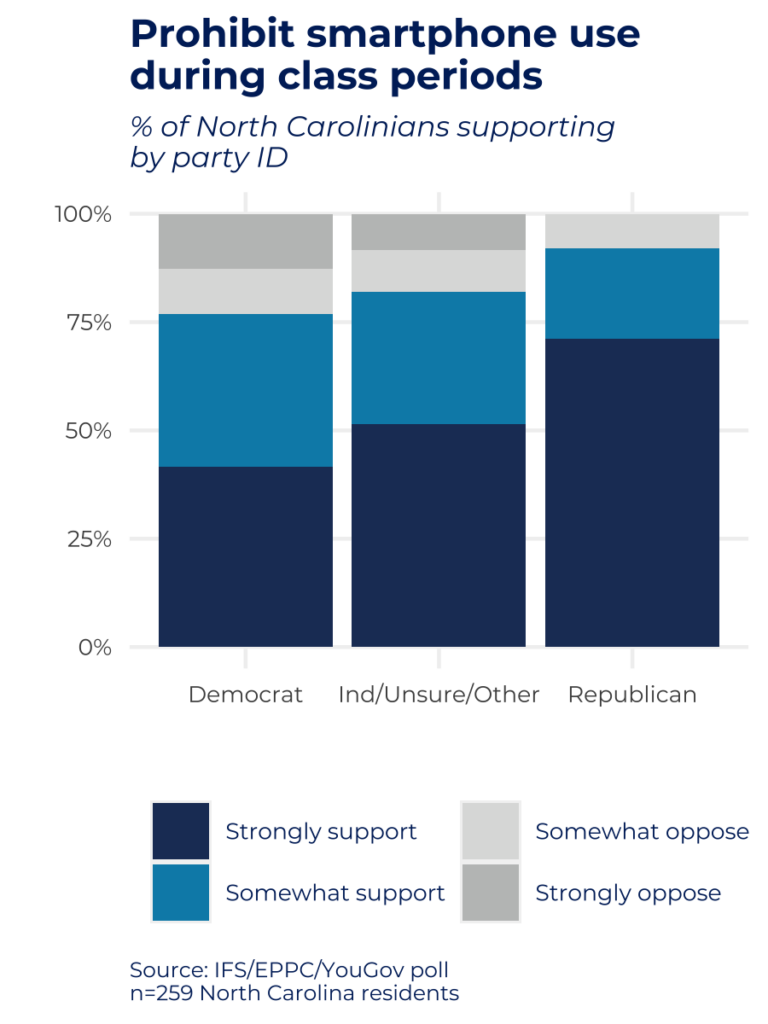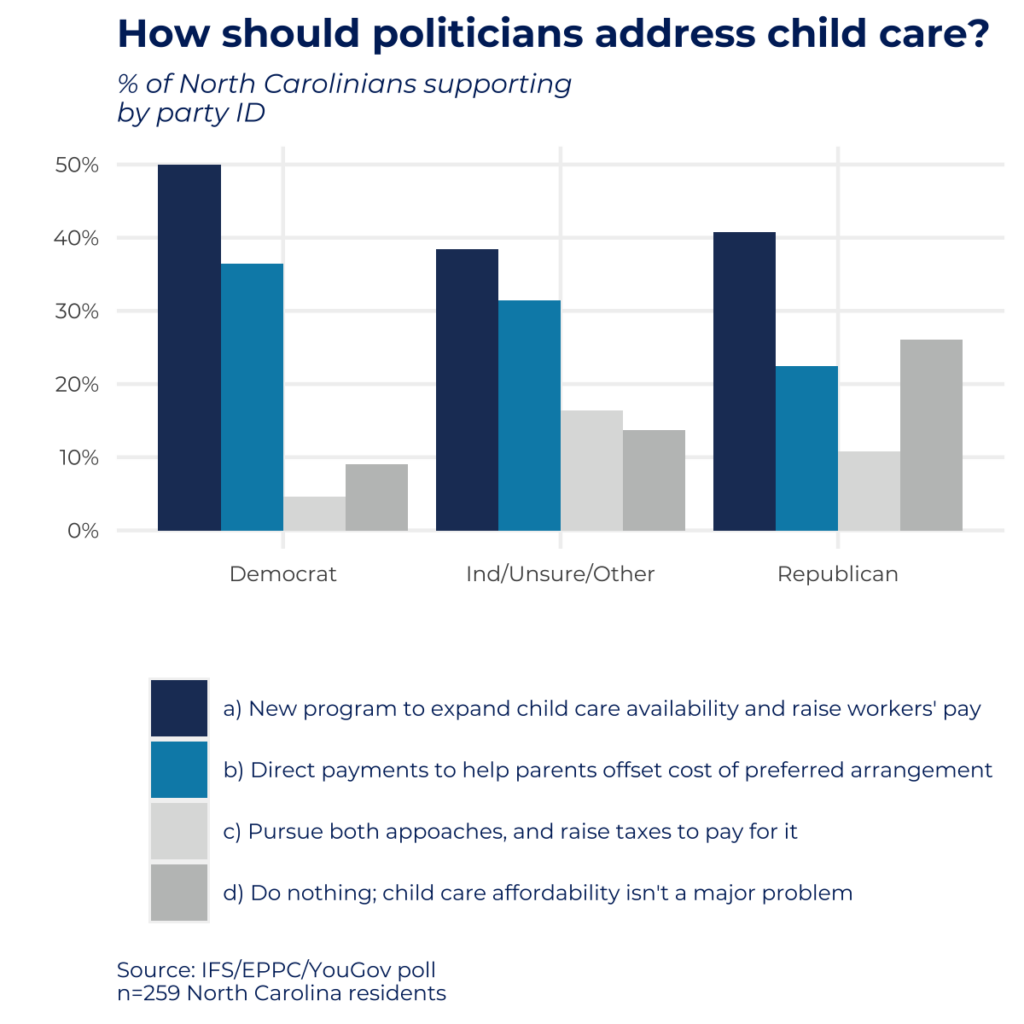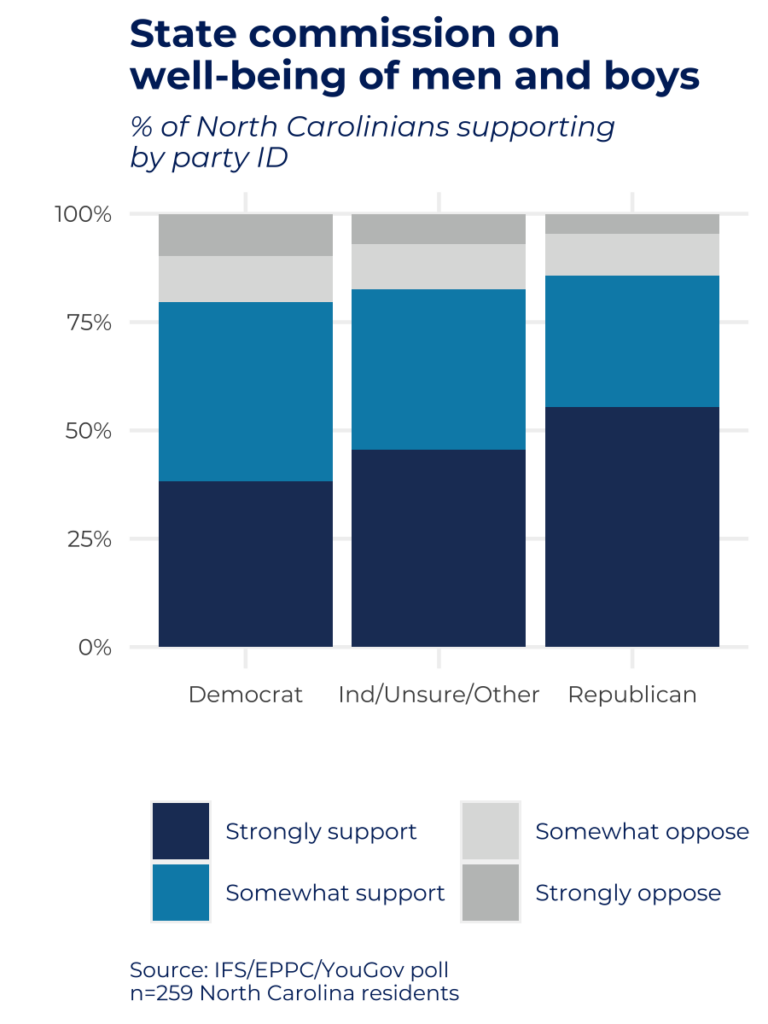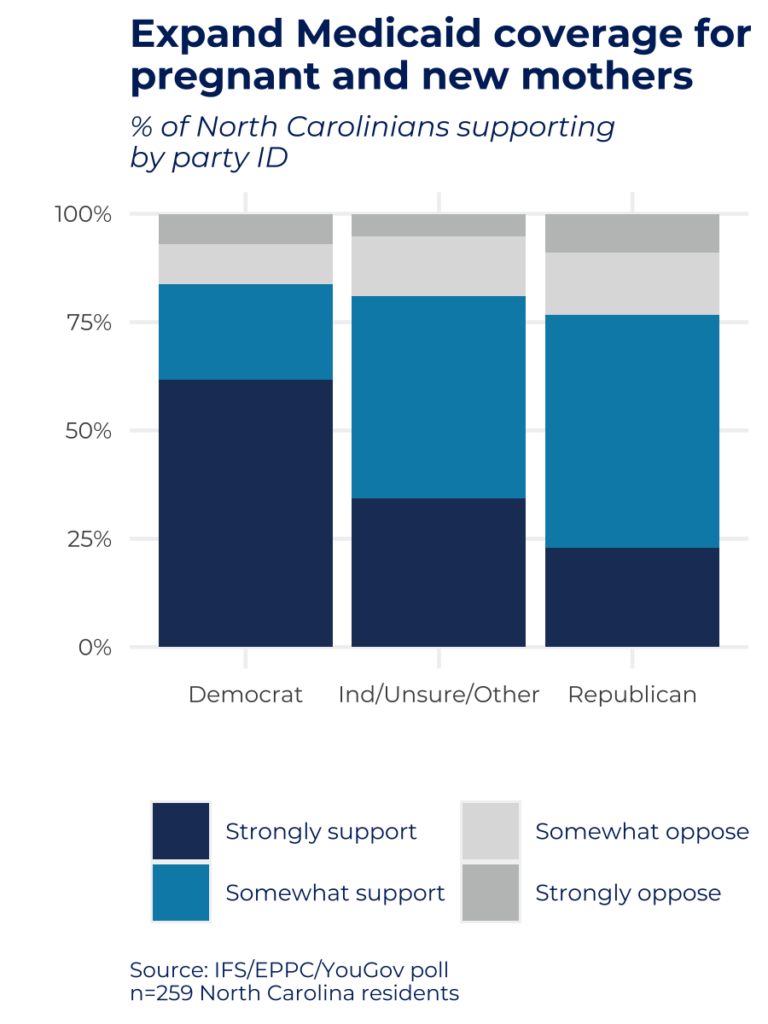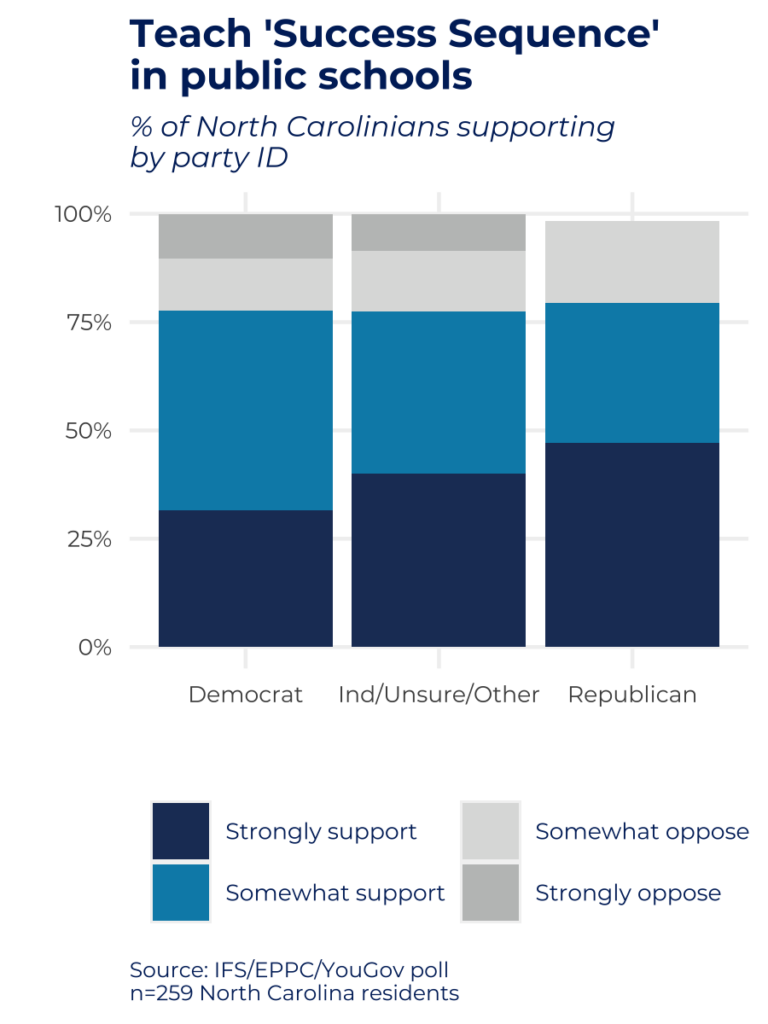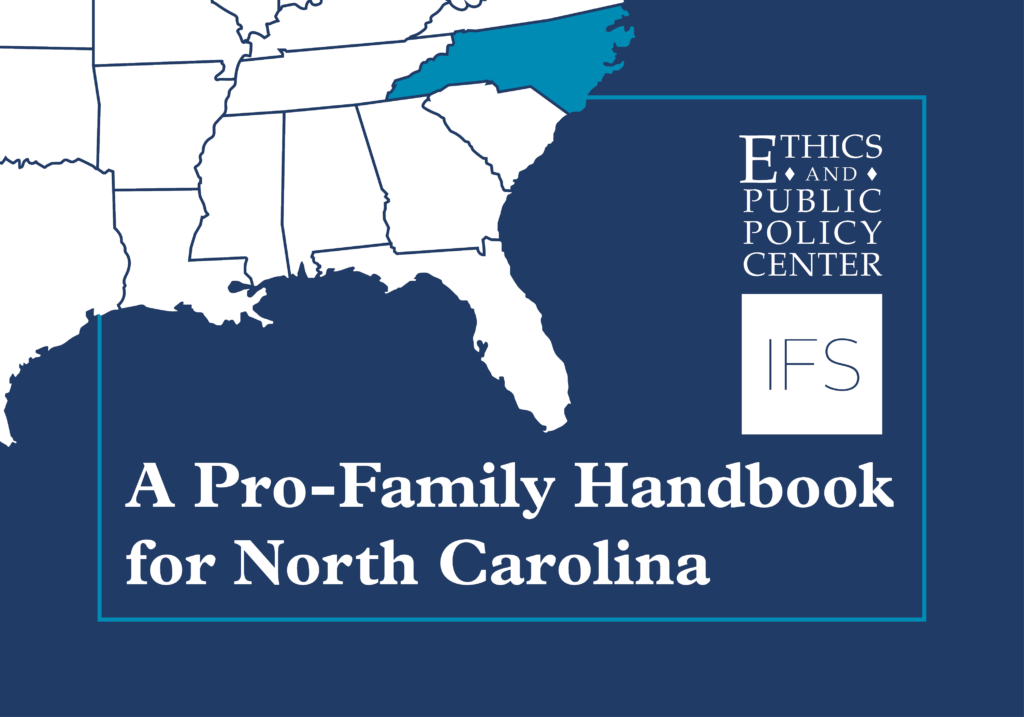
Published February 1, 2024
Introduction
The secret is getting out—North Carolina has emerged as one of the best states for families. The Tar Heel State is now the ninth most-populous state in the union, and boasts the third-highest population growth in the post-Covid period.
What’s more, lawmakers have found bipartisan compromise to advance meaningful steps towards helping parents thrive in the state. On education, tech, and social spending, North Carolina lawmakers have shown a willingness to move the ball forward in ways that deliver for parents. While families in the state are certainly not immune from cultural and economic pressures that make it harder for parents to have children and raise them in the manner they deem best, North Carolina now boasts an impressive track record in advancing pro-family policies.
Continuing to orient the state in a pro-family direction will require additional bold ideas. In a new YouGov survey commissioned by the Institute for Family Studies (IFS) and the Ethics and Public Policy Center (EPPC), parents make clear that they are looking for policies that will make raising kids a little more achievable—and will empower parents against the cultural forces that challenge family life. And our sample of North Carolina residents suggests that many of these policies are popular across the political spectrum.
This report offers five policies for North Carolina lawmakers to consider. Each of these areas don’t just poll well, as our survey data show, but—if constructed the right way—can meaningfully advance the goal of making it easier to start and raise a family. The five pro-family policy priorities highlighted in this report are:
(1) Ban smartphone use during class time in public schools
(2) Continue to expand early childhood and K–12 options for all parents
(3) Create a state commission on the well-being of men and boys
(4) Support strong families and healthy childhoods
(5) Reorient school curricula to focus on long-term well-being
Ban Smartphones During Class Time in Public Schools
83% of North Carolinians support restricting phone use during classes
Teens and young adults report rising mental health problems, show declining educational outcomes, and speak openly about the pressures caused by a life intermediated by social media. Lawmakers should act to give North Carolina’s children and teens a little more space from the electronic sphere by banning the usage of smartphones during class periods at public schools. This is a move that is widely support across the political spectrum: 83% of North Carolinians, including 92% of Republicans and 77% of Democrats, somewhat or strongly agree with a hypothetical proposal to ban the use of smartphones during class time.
Such a plan could include requiring schools to furnish a safe location for smartphones to be stored during class periods, or simply specifying that students may not be allowed to use phones during class periods without a teacher’s permission and empowering school districts to implement various strategies of enforcing such a ban. A bill to study these approaches, and their impact on student outcomes, was introduced in the North Carolina General Assembly last year, but has not been advanced out of any committee as of this writing.
North Carolina’s steps to protect kids online can be further amplified by giving parents more tools to help their kids navigate the internet safely. Asking individual parents to be an expert on the plethora of user settings, filters, and options for keeping age-inappropriate content away from their kids places an undue burden on families. Policymakers should reset the status quo around kids and tech with a comprehensive approach to giving parents more power to protect their kids online. Lawmakers could require that all social media platforms and other websites that allow minors to open profiles first obtain the explicit and verified consent of a parent or legal guardian. They could also require that all social media platforms give parents administrator-level access to view what content their children are watching, and who they are communicating with.
In our survey, parents were largely split between prioritizing measures that would require a parent’s permission before children could open a social media account or requiring tech companies to give parents more tools to filter or limit access to certain content. But of the parents we polled across the five states, only 17%—and 12% of Republican-leaning parents—said the problem of helping navigate kids and tech use was “not a problem government should try to solve.”
Continue to expand early childhood and K–12 options for all parents
84% of North Carolinians say child care affordability is a problem
Last year, North Carolina became one of the largest states in the country to pass universal school choice for K–12 students. That principle deserves to be applauded and expanded. Building on that success, North Carolina can ensure that “choice” is meaningful for children of all ages. Prioritizing a wide array of options for parents, along with new grant aimed at helping organizations launch or expand operations, could ensure a diversity of early childhood and K–12 options across the state.
The recent so-called “child care cliff” has driven additional attention to the needs of families with all parents in the household working. And North Carolina can improve the functioning of the child care market in the state; one recent start was in creating the position of a liaison focusing on the child care market in the Department of Commerce. But addressing child care in isolation can lead to some skewed policy approaches. Our poll found that while a strong majority of North Carolina residents wanted policymakers to help improve child care affordability, there was a partisan gap on whether it should be considered a major problem: 26% of Republicans, as opposed to 9% of Democrats, said policymakers shouldn’t make legislation on child care a priority.
More importantly, in early childhood, parents’ preferences vary widely; some prefer to have a parent at home full-time, others prefer to have a relative or neighbor watch their children while parents work full- or part-time, still others prefer a faith-based or for-profit child care center. To the greatest extent possible, policymakers should try to expand parents’ options in early childhood, rather than assuming a one-size-fits-all approach.
According to a national poll conducted in late 2020 by the Bipartisan Policy Center, 31% of working-parent households used center-based care, and of those 53% used one that was affiliated with a faith organization. One-third of parents participating in center-based care said the religious orientation of the facility was “somewhat” or “very” important in their decision, according to a government survey.
Therefore, any discussion of child care in North Carolina should include a focus on ensuring faith-based providers an essential part of the delivery system.
Additional grants to non-profit and religious organizations get a child care program off the ground or technical assistance to ensure compliance with regulations and requirements could help them build out enough capacity to break even. Similarly, churches or community groups interested in expanding K–12 education could benefit from a start-up grant or technical assistance for ensuring that true choice is available to more families. This attempt at capacity building would help ensure a pluralistic landscape for North Carolina parents to find the early childhood and K–12 option that is right for them, without putting a thumb on the scale of center-based child care or other options.
An early childhood and primary education capital expansion grant would grant non-profit and community organizations a three-year, partially-forgivable grant aimed at retrofitting or expanding existing physical spaces (not new construction), covering teacher training or certification, acquiring technology or other approved capital expenses. They would not be intended to cover normal operating expenses, but to provide religious and non-profit providers access to capital to help launch their new or expanded early childhood, elementary, middle, or high school educational offerings. The grant should be made available to facilities that serve children across all age groups, though a portion of funds could be allocated specifically to child care if desired.
Create a state commission on the well-being of men and boys
83% of North Carolinians support a state panel on the crisis facing men
Young men are now less likely to graduate from high school or college than women. Men, especially single or divorced men, are more likely to die from suicide or opioid-related causes. And these social dynamics contribute to delayed marriage, deferred parenthood, lower labor force participation, and a rising share of young men who are categorized as neither working, nor in education or training.
The cultural and economic factors driving these trends can’t be solved overnight. But a state Commission on Men and Boys would offer a focused, serious effort to rejuvenate policy and cultural efforts aimed at helping at-risk young men mature into their place in society.
In general, there was broad support for this kind of concerted action. Roughly four-fifths of North Carolina adults somewhat or strongly supported the proposal of a new “state commission that would study the well-being of boys and men, and promote policies that encourage healthy masculinity and responsible fatherhood.” Notably, there was very little difference in support across the political spectrum, and support was equally strong among college graduates and those without a four-year degree.
The Commission would look across the lifespan but focus on young and middle-aged adults who are struggling the most today. It would focus on cultural, educational, job, and social supports, and address policy issues such as reforming child support and alimony. Its efforts would include programs to reduce the number of absentee fathers, working with religious and non-profit organizations to develop outreach efforts to ensure dads have a relationship with their children. It would also be tasked with identifying opportunities to realign and re-envision career and technical education, often referred to as vocational ed, to ensure that all high school students, even those who don’t attend college or university, are given the tools they need to build a pathway to the middle class.
Part of this commission’s work would include a focus on the declining state of marriage in North Carolina. This has long-term ramifications, particularly for young men who are more likely to grow up without a positive male role model in the home. Kids who grow up without two parents present are at risk for higher rates of academic struggles, health complications, involvement with the justice system, poverty, and other factors associated with social breakdown.
Part of the commission could also be tasked with evaluating the extent to which marriage penalties in state safety-net programs are discouraging young men from marrying. Fully solving marriage penalties is expensive, and best pursued at the federal level. But the state could explore taking steps towards reducing the impact of marriage penalties on low-income households by, where possible, easing the sharp cliffs that makes getting married a financial loser for too many parents. Offering a honeymoon period, where newly-married couples are able to maintain safety-net program eligibility for a year or two after marriage, could also help families adjust without abruptly cutting them off of benefits.
Support Strong Families and Healthy Childhoods
Two-thirds of North Carolinians support Child Tax Credit for working-class families
Everyone should want children born in the state of North Carolina to have a healthy start in life, particularly in the context of the recently-passed Care for Women, Children, and Families Act. Children who grow up to unmarried parents are much more likely to grow up in poverty. Restoring a culture of marriage, particularly for working-class North Carolinians, would be the most important way to welcome more children and ensure they are supported with the resources they need to thrive.
Over the past decade and a half, the share of North Carolina babies born to married parents fluctuated around 60%, roughly the same as the national average. Ever since 2011, the number of births to unmarried women has remained relatively constant, even as the state’s population has grown. Births to married women jumped upwards in 2021, indicating the influx of families to North Carolina post-Covid and the flexibility accorded by remote work policies.
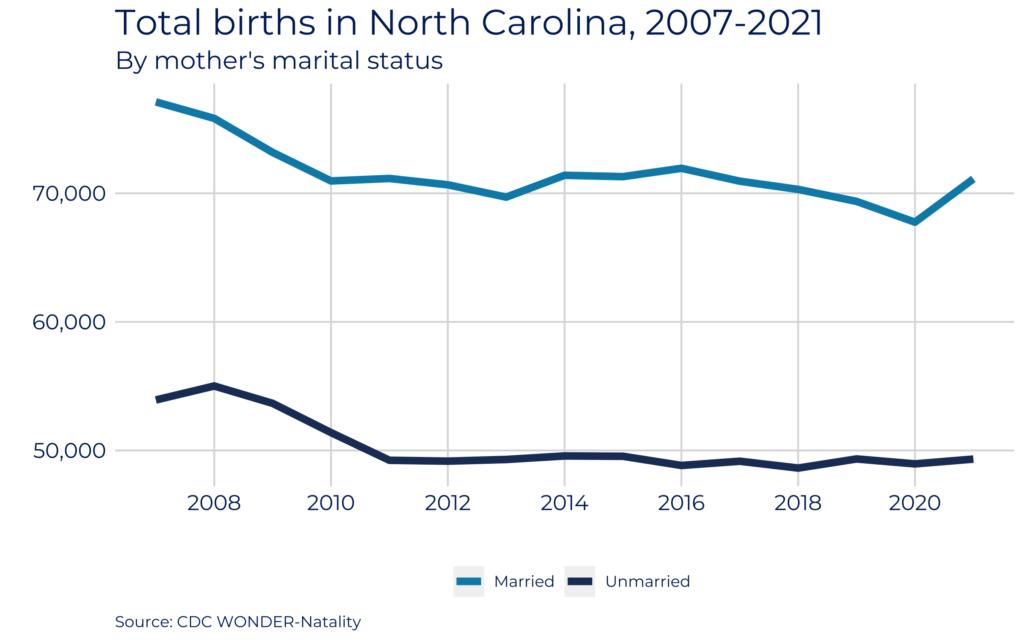
Some states have adopted a straightforward way of helping families ensure a healthy start via a state Child Tax Credit (CTC). Idaho, Oklahoma, and Utah offer non-refundable CTCs (i.e., the amount of the credit cannot exceed a households’ tax liability), and 11 states have made the credit fully refundable, with various eligibility thresholds and credit amounts. For example, the state of Vermont offers taxpayers with incomes below $125,000 a $1,000 per child CTC under the age of 5. An approach similar to Vermont’s, that targeted meaningful assistance to working-class families with young children, would likely require a fiscal commitment of roughly $730 million per year. In our survey, over two-thirds of respondents somewhat or strongly supported a state level Child Tax Credit.
A universal, or near-universal, state child tax credit could support new parents to a broad degree. Multiple polls have found plurality of new moms say that their “ideal” situation would be to work have one parent part-time or stay home, especially when their children are young. Paid leave programs tied to work leave out those moms, just as expanded child care subsidies leave out those families who prefer to have a relative or neighbor watch their child. A state CTC, or child benefit, would give parents more money in their pocket to determine the work-life balance that is best for them, and more time to ensure their young children have a healthy start to life.
Another proposal that some states have explored is universal school lunches, in which all students, regardless of income, are considered eligible for free lunches and/or breakfast at schools. Some states have designed their program to allow non-public schools, such as parochial schools, to participate in the program. Universal school lunches received largely favorable responses from our respondents in North Carolina, with four in five respondents somewhat or strongly supporting the idea. Among parents in the state, 96% strongly or somewhat supported the proposal.
We also surveyed whether Medicaid coverage should be expanded to cover a larger share of pregnant women. North Carolina’s recent expansion of Medicaid has allowed more low-income individuals and families access to health coverage, but pregnancy and postpartum care remain significant stressors for many young parents. Currently, pregnant women in households up to 201% of the federal poverty line are eligible to have their pregnant, childbirth and postpartum costs covered by Medicaid; thanks to recent action by North Carolina’s legislature, new moms are now eligible to remain on Medicaid up to a year after birth. When we asked whether eligibility should be expanded to households making the equivalent of 300% of the federal poverty line, there was a visible partisan divide in “strong” support, but overall support remained above three-quarters of respondents across political identification.
Reorient school curricula to focus on long-term well-being
3 in 4 North Carolina respondents favor teaching the ‘Success Sequence’ in public schools
As young people increasingly delay, defer, and opt out of marriage, studies find commensurably lower levels of happiness, and higher rates of loneliness, depression, and suicide. Marriage rates in North Carolina are now largely paralleling the United States, with an influx of college-aged residents helping keep it from falling below the national average.
As social scientists have pointed out, certain habits and decisions are associated with long-term flourishing. Specifically, young adults are “60% less likely to be poor if they put marriage before the baby carriage.” Likewise, “97% of young adults who get at least a high school degree, work full time, and marry before having children avoid poverty in their late 20s and early 30s.” To help its citizens flourish, the state of North Carolina should embrace its responsibility to inform young people about these statistics, and encourage them to think about the long-term trajectory of their lives in ways that go beyond just career readiness.
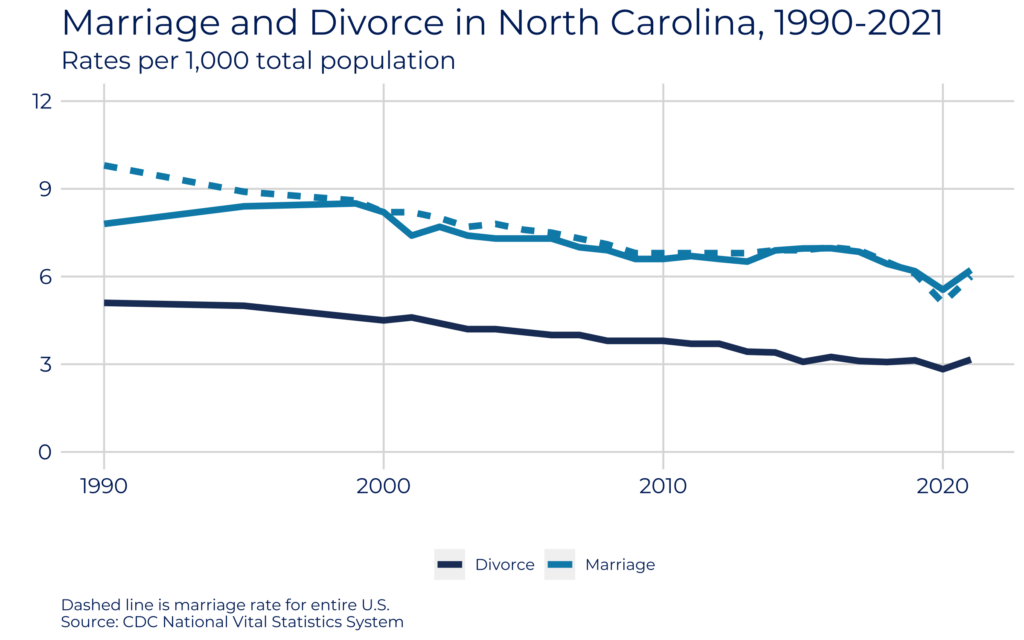
Preparing young Tar Heel State residents for the economy of the twenty-first century is important—but it is even more important to equip them to think about building strong families and healthy futures in an environment which increasingly hostile to family life.
This approach is broadly popular. We asked North Carolinians in our survey their opinion of a “proposed requirement that all public schools teach the ‘Success Sequence,’ the idea that young people who graduate from high school, work full-time, and marry before having children are more likely to avoid poverty and be financially successful later in life.” Three-quarters of respondents, across the political spectrum, somewhat or strongly supported the idea.
To accomplish this fuller vision of education—as about more than just test scores, but equipping students to live a rich and meaningful life—the North Carolina Department of Public Instruction could be directed to require that state educational incorporate a family life standard into curriculum standards that would teach that:
- A high school graduation, full-time work, and having children after marriage are linked to less poverty and greater prosperity for adults.
- Sequencing marriage before parenthood is associated with greater family (and thus financial) stability.
- A stable, married family is linked to better educational, social and emotional outcomes for parents and children, many of which are associated with more positive financial outcomes.
It could also include basic facts about fertility, work-life balance, home economics, happiness, and human flourishing. These would prepare students to think about their long-term goals, including preparing to form families as well as seek out meaningful work. And informing students in high school about fetal development, such as when a heartbeat is detectable or when a fetus’ fingerprints form, could help provide richer and better-informed debates around abortion in the state.
These topics could be incorporated into its recently-introduced half-credit high school graduation requirement in personal financial literacy, or used to supplement the required units of career-focused electives.
School districts could also be directed to collect student academic data by family structure, in addition to race and other demographic characteristics, to give researchers better insights into the value of a stable home environment on student achievement.
Patrick T. Brown is a fellow at the Ethics and Public Policy Center, where his work with the Life and Family Initiative focuses on developing a robust pro-family economic agenda and supporting families as the cornerstone of a healthy and flourishing society.
